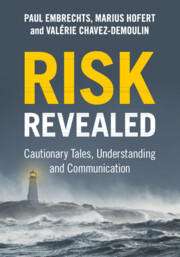Book contents
- Frontmatter
- Dedication
- Contents
- Preface
- Introduction
- 1 The 1953 Great Flood
- 2 The Space Shuttle Challenger Disaster
- 3 The 2007–2008 Financial Crisis
- 4 Earthquakes and Tsunamis
- 5 The L’Aquila Trial and the Public Communication of Risk
- 6 The Coronavirus Pandemic
- 7 Mathematical Wonderland
- 8 Stochastic Modeling
- 9 The Modeling of Extreme Events
- 10 On Climate Change and Related Risk
- 11 Further Examples from the World of Extremes
- 12 Networks
- 13 The Black Tulip and February 3, 1637
- A Note About the References
- References
- Index
12 - Networks
Published online by Cambridge University Press: 05 April 2024
- Frontmatter
- Dedication
- Contents
- Preface
- Introduction
- 1 The 1953 Great Flood
- 2 The Space Shuttle Challenger Disaster
- 3 The 2007–2008 Financial Crisis
- 4 Earthquakes and Tsunamis
- 5 The L’Aquila Trial and the Public Communication of Risk
- 6 The Coronavirus Pandemic
- 7 Mathematical Wonderland
- 8 Stochastic Modeling
- 9 The Modeling of Extreme Events
- 10 On Climate Change and Related Risk
- 11 Further Examples from the World of Extremes
- 12 Networks
- 13 The Black Tulip and February 3, 1637
- A Note About the References
- References
- Index
Summary
One of the most counterintuitive examples involving randomness is the birthday problem. From 23 persons onwards, the probability of finding at least two people in a group with the same birthday is above 50%. Leonhard Euler’s solution of the Koenigsberg bridge problem heralded the start of the fascinating field of graphs and networks with applications to numerous applied problems across many disciplines. In 1929 the Hungarian writer Frigyes Karinthy highlighted the world’s smallness through his wonderful story “Chains” where he introduced the by now well-known “separation by six” idiom. Starting from these examples, we discuss some risks due to network effects present on the World Wide Web and social media. We present the reader with a glimpse of the fascinating world of coincidences. For instance, the law of truly large numbers states that, with a large enough sample, any outrageous thing is likely to happen. Real-life examples highlight the meaning of this law.
Keywords
- Type
- Chapter
- Information
- Risk RevealedCautionary Tales, Understanding and Communication, pp. 326 - 336Publisher: Cambridge University PressPrint publication year: 2024

